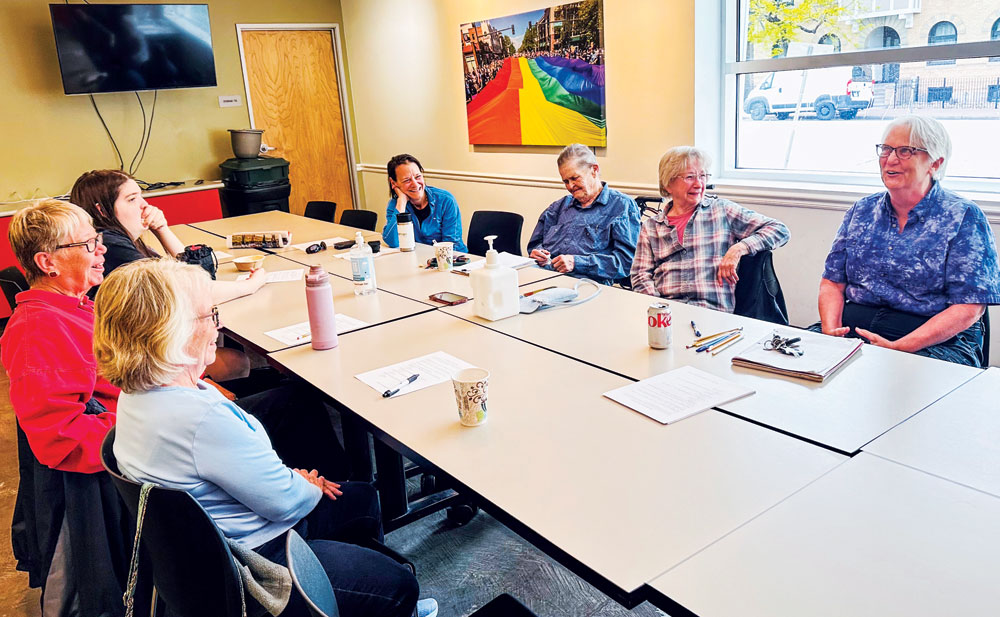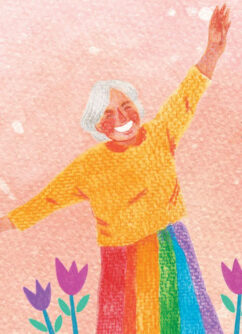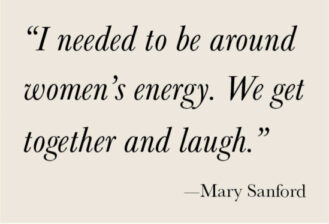
A weekly meeting at The Center on Colfax in Denver offers a group of women a safe space to gather and share their experiences about life in the LGBTQ community. Front Porch photo by Christie Gosch

A weekly meeting of women in Denver
focuses on friendship, support,and
acceptance for the LGBTQ community. Image courtesy of The Center on Colfax
Inside a plain building along East Colfax Avenue in Denver are colorful walls adorned with rainbows and photographs. It’s a safe place for the LGBTQ community to gather.
On Monday mornings, a group of women meet to share laughter and tears—a group called The Lesbian Lounge at The Center on Colfax.
Carey Candrian, PhD, an associate professor at the University of Colorado School of Medicine, leads the group, which she says provides community for the women and for herself.
“We know isolation and loneliness plague a lot of people, and especially LGBTQ people,” Candrian says. “Community literally is a protective factor against a lot of physical, mental, emotional risk factors. That’s what this group is about—creating a weekly space for people to come together and talk, laugh, cry, learn, and just be connected safely.”
The Lesbian Lounge is just one of the groups that are part of The Center of Colfax’s West of 50 program that caters to older adults. There are groups for all ages. And this month, the center is marking the 50th anniversary of Denver PrideFest.
Front Porch was invited to a meeting where women shared personal experiences with grief, marginalization, and overcoming challenges. They emphasized the importance of supportive environments, empathy, and education in promoting inclusivity.
Here are their words:
Mary Sanford
 “It feels like I’m a recent widow, but my wife died in 2020. We were together almost 30 years. I had taken care of her after strokes for about four years. I was very isolated. I needed to be around women’s energy. This group has meant a lot to me. We get together and laugh.
“It feels like I’m a recent widow, but my wife died in 2020. We were together almost 30 years. I had taken care of her after strokes for about four years. I was very isolated. I needed to be around women’s energy. This group has meant a lot to me. We get together and laugh.
“I had a very easy coming out. I feel grateful that I had a next-door neighbor who was gay, and I was a single mother of three. We never had a relationship, but we became lifelong friends. She introduced me to a lot of people, and I just kind of fit in. It was my belief system. I felt lucky.
“Having raised children was a big part of my responsibility for education. As a parent, you must talk to kids.”
Sandy Crane
“I’m a more recent widow but I also needed lesbian people in my life.
“We were all taught a different history. It’s not that we just buy it and move on. You must be curious. Don’t take one person’s word. Take two or three people and the truth will be somewhere in the mix of that. And that’s what this group is about, three or four points of view. I can learn. I can experience and grow and still be curious.
“We are facing the same struggles you are. Why can’t we talk about it because I sleep with someone different? I’m sorry. But that seems to be your problem, not mine. So, [discrimination] is a struggle, and we feel it. It used to be more in your face, but now it’s much more subtle.”
Karen Davidson
“I am in the same set of circumstances [a widow]. It’s been like carrying around a shroud. Sandy introduced me to Mary and the three of us now also Zoom together on Thursdays and in some cases talk about how many times we’ve cried during the week.
“I want to say to people, you’re missing out on not coming here. We have fun, we laugh. We empathize with people. I think empathy is very important. And when I leave here and go home, I fall back on that thought a lot. Because there’s still somebody missing.
“Years ago, there was somebody I worked with. I liked him and he told me one day I was good at what I did. He really appreciated my help in difficult situations. But he didn’t like my lifestyle.”
“Talk to your neighbors. People are out walking with their kids but they’re looking around. Just step outside and say ‘hi.’ We’re just people.”
Mimi Shwarz
“I started coming here about a year and a half ago. I recently retired. I saw this group and it was just made for me. I like being able to do what I want during the day and come and just have this company of people that’s different than any other group.
“I had an easy time coming out. I remember realizing that I was a lesbian when I was 15 or 16 years old. It was shocking to me. But then I thought, who cares? It was that realization that made it easier. I came out to the rest of the world when I was probably about 19. My first partner and I were together for about 25 years. That was her first relationship as well. I think that’s what made it easy, both of us coming out at the same time.”
Mary Spiegel
“I love this group. It’s intentional about getting different speakers here. We’ve had women share incredible life stories that are multi-generational. They haven’t become history lessons. We’ve had people from the LGBTQ community talking about access to healthcare.
“On top of that, are the friendships that develop. We take care of each other. We really do support each other. I took a class on how to do drag and I came in to do my show with them.
“We have it easier because we’re in a large metropolitan area. I think we take it for granted. One thing that was different for me than most of the people in this room is when I came out, I’d been married [to a man] for 18 years. Most of my friends were lesbians, so it didn’t really surprise anybody, but I was raised in a religiously conservative environment. I was doing the next right thing to get married. So, I didn’t start dating women until after my divorce. What they say about coming out later in life is, it’s a second adolescence. Your world is totally turned on its head. You were living a different lifestyle and then suddenly, you’re living another lifestyle.”
Jude Gassaway
“I started coming to women’s groups when I was coming out in the 1980s. I have been coming here off and on. I’m just entering the first stages of dementia, and one of my problems is I don’t remember the last thing that just happened or the last event, but I can remember back to 1980. We’re all dealing with similar issues. And we can all learn from each other and support each other in that sense.
“I was born in 1940 before the war started. My dad wanted to be a conscientious objector because he didn’t think war was a good idea. So, he was already on kind of the left side of things. And mom was with him on that. I was lucky in that my parents were very accepting.
“I think that we need to be aware of public education that has contributed to gay and lesbian acceptance. They start teaching kids in first and second and third grade, even if they come from a religious family, asking, ‘Why don’t you treat these people equally?’”
Rachel Doyle
“I moved here to Colorado from Texas about two years ago and I didn’t really have anyone to talk to, so I started coming here to socialize and acquire a friend group that I previously didn’t have as a new resident. It’s amazing.”
Newcomers are always welcome. For more about The Center on Colfax, including Pride events, visit lgbtqcolorado.org.


0 Comments